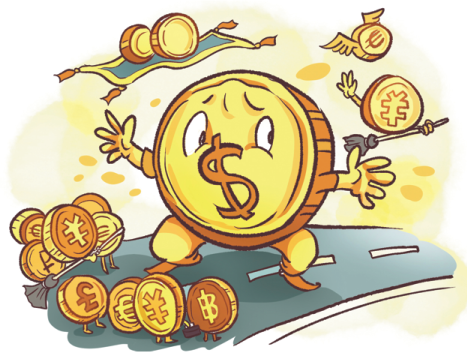Why de-dollarization is inevitable

Editor's note: The abuse of the dollar's status as the international reserve currency by the United States and the losses other economies suffer due to the dollar's wild fluctuations and US economic sanctions are prompting more and more countries to seek countermeasures, by using their domestic currencies to settle trade payments, thus triggering what could be the de-dollarization of the global economy. Four experts share their views on the issue with China Daily.
In 1023, a thousand years ago, the Song Dynasty (960-1279) changed the history of money by introducing paper money, jiaozi, as legal tender and a means of exchange. The shift from cumbersome stores of value such as gold and silver to government-backed paper money started in southwestern Chengdu and eventually became the world standard, which facilitates global trade and commerce to this day.
A full millennium later, China is again set to transform the history of money, first, by spearheading the transition from paper money to the era of digital currency, leading the world in mobile payments and adopting Central Bank Digital Currency, through its digital renminbi and, second, by spearheading the transition away from the US dollar as the global reserve currency.
The dollar's special status is one of the three enablers of the United States' global pre-eminence, the other two being its military power and its alliance system. The US accounts for only one-tenth of global trade but about half of global trade is invoiced in dollars. Until recently, this disproportional reliance on the US currency was widely accepted by most countries in the world, but now more and more countries are saying they want to reduce their dependence on the greenback.
The rallying cry for "de-dollarization" which until recently had been raised by some "ostracized" leaders is now becoming mainstream. This month, French President Emmanuel Macron called for Europe to reduce its reliance on the US dollar to avoid becoming "vassals" of the US. A week later in Shanghai, Brazilian President Luiz Inacio Lula da Silva called on developing countries to work toward replacing the US dollar with their own currencies in international trade.
Driving these calls for de-dollarization are two mutually reinforcing trends. The first is the growing discomfort with the US' international behavior, especially its overly aggressive use of economic coercion and long-arm jurisdiction. Today, one in 10 countries are under US sanctions, and tens of thousands of individuals and corporations are excluded from the global banking system because they violated so-called Washington's rules. Companies are unable to conduct business with their counterparts in countries with which their governments have no dispute just because of the fear of being targeted by secondary US sanctions.
The Russia-Ukraine conflict has set new precedents: freezing and seizing of private and government assets without due process, disconnecting the banks of certain countries from the Society for Worldwide Interbank Financial Telecommunication, and imposing wholesale sanctions on individuals, corporations and other entities, leading many countries at odds with the US to rethink the wisdom of the greenback's continuous dominance of global trade and commerce.
The second trend is one of a growing sense among countries that the dollar is no longer a safe store of value due to the US' economic practices, especially its out-of-control spending and its ballooning national debt which is nearing $32 trillion and is projected to reach $44 trillion by 2027. The US' federal debt-to-GDP ratio has grown over the past 20 years from 60 percent to 130 percent, and is projected to hit 150 percent by 2027.
A quarter of the US debt is owned by foreign countries, many of them no longer willing to increase their holdings of US debt. Last year, Japan and China, the two largest holders of US Treasuries, jointly reduced their holdings by $400 billion — equivalent to half of the US' defense budget. In the same year, US deficit reached $1.38 trillion.
In other words, while the US' borrowing needs are on a perpetual rise, many countries are increasingly reluctant to lend it money, especially when much of this money could be used against their interests, for example, by financing military expansion, and instigating foreign wars and color revolutions.
As the top trading partner of no fewer than 120 countries and as the world's leading commodity importer, China is the only economy that can put a dent in the dollar's reserve currency status. It can shift an increasing part of its trade from the dollar to other currencies and urge its suppliers of energy, food and minerals to not only accept non-dollar payments for their commodities but also to price them in alternative currencies.
China's predominant role in the groupings of the Global South such as BRICS and the Shanghai Cooperation Organization, and its initiatives like the Belt and Road Initiative enable it to propel a change in the global monetary architecture in which the dollar is replaced not by a single national currency but by what can be defined as "currency multipolarity", under which a number of currencies of major economies and groupings compete with each other over their share in global trade transactions.
In a 2019 interview from his prison cell, Lula said the rationale behind the formation of BRICS was to "create our own currency to become independent from the US dollar". After returning to power in Brazil, Lula has made no secret of his plan to join China and other existing and prospective BRICS members in developing alternatives to the dollar based on a BRICS currency basket comprising the Five Rs — real, ruble, rupee, renminbi and rand.
In the thousand years since the Song Dynasty changed the history of money, no fewer than six reserve currencies, each belonging to a superpower of the time, have ruled the markets. Each dominated the global market for 80-100 years, and the tumbling of a currency accelerated the decline of the empire behind it. The dollar has been a global reserve currency for the past 80 years and if history is our guide, we are due for a rerun.
To be sure, both the US and its currency will continue to play a central role in world affairs for many years to come, but in the new order there will be no more room for hegemony, superpowers and winner-takes-all strategies. And, as Republican Senator Marco Rubio recently lamented, the US will increasingly lose its ability to sanction other countries. Under "currency multipolarity", money will return to become what it was always intended to be: a means of exchange and a store of value, not an instrument of economic statecraft.
The views don't necessarily reflect those of China Daily.























